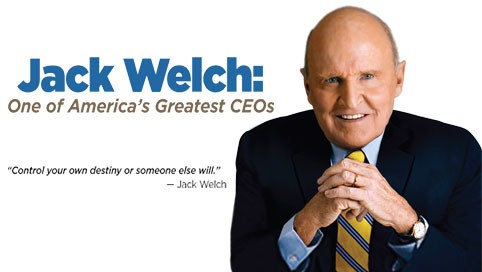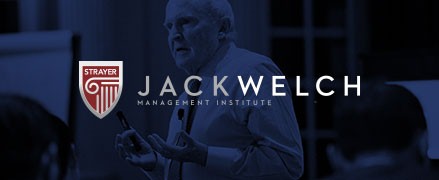Jack Welch
In the 20 years that Jack Welch led GE, its revenues rose from $30 to $130 billion and company value went from $14 to $410 billion. Isn’t this sort of miracle? Not surprisingly, each of us would like to be the next god of corporate improvement, but little do we know what it takes to follow in Jack Welch’s footsteps.
Jack Welch joined GE in 1960; he worked in the initial years on restructuring plan, which included retrenching, positioning the SBUs, planning proper segmentation and positioning of the products and most importantly selling off the unsuccessful SBUs of GE. He was named CEO of GE in 1981. “You can’t grow long-term if you can’t eat short-term,” is the philosophy practiced by Jack Welch. Balancing long-term and short-term goals is a tricky job. Many long term goals will have short term goals that lead to them. Not only does this make practical sense but it helps managers grounded and not to lose sight of them. He turned around GE with by utilizing human process. According to him respecting individual worker is most important for any organization.
Jack Welch developed 4 E model of leadership. The four Es are Energy, Energizers, Edge and Execute. People with energy possess boundless vigour and get up every day ready to attack the job at hand. High energy people drive the creativity in organization. Energizers outline a vision and get people to carry it out. Energizers know how to get people excited about a cause or a campaign. They are selfless in giving others the credit when things go right, but quick to accept responsibility when things go wrong. Those with edge are competitive types. They don’t shy away from making really difficult decisions; decisions such as hiring, firing and promoting. They are confident of decisions taken. Welch says that the key to successful leadership is implementation of plans. Without measurable executions, the other “E’s” are useless. Smart executers recognize that activity and productivity are not the same and are capable of converting energy and edge into execution and action which lead to constructive results.
Under Welch’s leadership, managers had wide autonomy in building their GE units in entrepreneurial fashion. Determined to connect the collective power of GE employees, Jack Welch redefined also relationships between boss and subordinates. He wrote: “The individual is the fountainhead of creativity and innovation, and we are struggling to get all of our people to accept the countercultural truth that often the best way to manage people is just to get out of their way. Only by releasing the energy and fire of our employees can we achieve the decisive, continuous productivity advantages that will give us the freedom to compete and win in any business anywhere on the globe.”
Do not manage: Welch doesn’t like the term ‘manage’. To him, it invokes negative image, such as ‘keeping people in the dark’ and ‘controlling and oppressing people’. Welch’s goal was to lead, create a vision and make people passionate about their work. Leadership, according to Welch, anyone who contributes, comes up with good ideas and can energize, excite and inspire other people rather than weaken, depress and control is a good leader.
Bureaucracy really cripples organizations. Conversely, working in a smaller firm can mean negotiating and then developing new policies and practices every time a new situation arises. Clearly, Welch dealt with an advanced and deep-rooted bureaucracy when he joined GE. Lifting this constraint was a key to his strategy. When Jack Welch took over GE when it had more than 400,000 employees spread around the world; that meant a lot of confusing and contradictory regulations and rules were floated. The first thing he did was writing policy, training staff, measuring adherence to standards, establishing gatekeepers, and installing controls.
Welch never feared change; he insisted that his managers, from senior level on down, must embrace change. Everything is constantly changing, says Welch. Right from market conditions, the business environment, consumer spending habits habits, advances in technology, new products, competition everything keeps changing.
He always acknowledged the facts so that the company could exploit it.
According to Welch, CEOs and all managers who deliberately ignore the facts of their business, the business environment, and general market and economic conditions are doomed to fail.
In 2009, Welch founded the Jack Welch Management Institute (JWMI), a program at Chancellor University that offered an online executive MBA. The institute was acquired by Strayer University in 2011. Welch has been very actively involved with the curriculum, faculty and students since the beginning of the institution. JWMI’s MBA program was recently named the number one most influential education brand on Linkedin and one of the top business schools to watch in 2016.
At GE, Welch became known for his teaching and growing leaders. He has taught at MIT’s Sloan School of Management and teaches seminars to CEOs all over the globe. More than 35 CEOs at today’s top companies are trained under Jack Welch. He demonstrates his passion for the institute by being highly involved with the students, faculty, and the development of the curriculum. JWMI students have direct access to Jack Welch, and he hosts quarterly video conferences with his students.
Jack Welch is a long-time Republican Party supporter; in an interview on CNBC he backed Donald Trump because he likes the real estate mogul’s policies on tax reform, government regulations and national security more than those of Hillary Clinton. Welch is candid about his views and opinions for the forthcoming US Presidential Elections taking place on November 8th 2016.















































